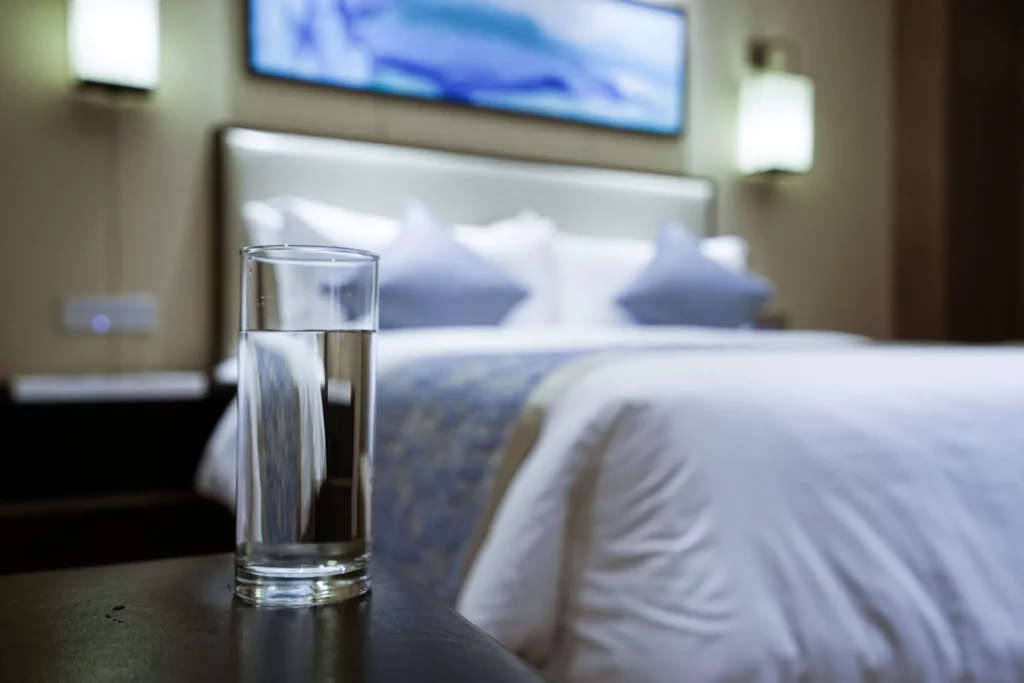There are so few obvious pairs in life with hydration and sleep being one of them. When you think of sleep you think of obvious methods for improving sleep, such as meditation, melatonin, or a relaxing bath, but how does staying hydrated factor into your sleep health?

Staying Hydrated: 5 Facts About Dehydration
The importance of drinking water is common knowledge, but we’re so wrapped up in our daily lives that we often forget to stay hydrated.
Dehydration Affects the Brain
If you’ve ever had days where you feel your cognitive function is a bit hampered, it could be from a lack of hydration. Brain fog is the term used for when you’re having difficulty focusing and are generally struggling with mental clarity.
While stress and lack of sleep also lead to brain fog, dehydration is a major cause of it too. Even a minor percentage of dehydration can cause a major dip in cognitive performance.
Dehydration Slows Your Metabolism
The link between hydration and metabolism is as surprising as the one between hydration and sleep. Metabolism, the rate at which your body expends energy, needs the water to generate this energy.
Unfortunately, dehydration is often overlooked as a cause of a body’s declining metabolism, so it’s important to drink enough water to keep your body functioning.
Dehydration Affects Your Gut
Dehydration affects your gut in several ways. One way your gut uses water is by absorbing it from the waste passing through your system. If there’s not enough water in your gut, then the waste dries up, hardens, and causes constipation and other gut issues.
Keeping your gut hydrated not only improves your gut’s microbiome, but it keeps the lining of your gut lubricated for easy passing of waste.
Dehydration Worsens Your Joints and Cause Muscle Spasms
As we age, our bones become naturally weaker. Our joints are one of the first bones to be affected by age. Many aren’t aware that most of the lubrication our joints need for movement comes from water.
Getting the proper amount of water daily keeps your joints properly lubricated to reduce friction with the bones. When it comes to muscles, almost eighty percent of your muscle mass is water. That means, when you’re dehydrated, your muscles will start to spasm.
Dehydration Causes Fatigue
Your body loses about 3 liters of water a day from normal everyday activities. Dehydration causes a drop in blood pressure that reduces blood flow to vital parts of the body, such as the brain. When there’s decreased blood flow to the brain, you feel fatigued.
Dehydration is somewhat of a two-pronged spear when it comes to fatigue as it leads to fatigue in more ways than one. Not only does a drop in blood pressure affect fatigue, but dehydration also forces your heart to work overtime, which increases fatigue even more.
Now that you know the connection between dehydration and your body’s different processes, how does it all relate to sleep?
The Connection Between Dehydration and Sleep
Think of everything you just learned about dehydration and link it back to sleep. Fatigue may cause sleepiness, but the quality of sleep you get when fatigued isn’t enough for the body to feel rested.
Joint, gut, and muscle pain can also keep you up at night. Random muscle spasms due to dehydration can lower your quality of sleep. Gut pain from constipation, gas, or other complications stemming from an unbalanced gut microbiome creates sharp or tightening pain as you’re trying to sleep. Many restless nights are also associated with joint pain which, not surprisingly, is also worsened by the lack of sleep itself. It might seem all of these are a never-ending cycle, but much of these issues can be alleviated by simply staying hydrated.
Tips For Staying Hydrated Before Bed
After reading all this, it might seem like the best option would be to consume copious amounts of water before bed. However, too much water before bed is more detrimental than not drinking water at all. Drinking too much water before bed will have you waking up prematurely with a full bladder. Here are some tips to follow for improving your sleep hygiene while maintaining a healthy water intake.
Start With Water-Rich Foods and Diluting Drinks with Water
Before you start thinking of simply replacing your morning and afternoon iced tea with water, you will have to wean yourself off it first. Dilute your tea with more water than normal and throw a couple more pieces of ice in there.
If you’re having a difficult time replacing your drinks, then you can get a healthy amount of water from raw vegetables and fruits such as watermelon, cucumber, and grapefruit.
Drink Water Slowly Throughout the Day Instead of Right Before Bedtime
As mentioned before, if much of your water intake takes place right before bedtime, then it’s counterproductive to your sleep health. If your goal is to improve your sleep hygiene by tackling the issue of dehydration, then staying hydrated throughout the day is the best option.
If you’re struggling to intake more water, then following the steps above throughout the day should be sufficient to your sleep health.
Watch Your Activity Level
Staying active through the day, whether you’re at work, outside, at the gym, or moving around in general, means you’re depleting your body of fluids at a faster rate. If you find that you’re sweating more than normal throughout the day, you should aim to consume more water during the day.

Watch What Else You’re Drinking
Finally, make note of what else you’re drinking, besides water, and how it’s affecting your sleep. Consuming sodas, energy drinks, or coffee about six hours before bedtime will keep you up much longer.
The caffeine also acts as a mild diuretic which means you’ll be expelling more water than you’re taking in. That’s why it’s important to watch what you’re drinking.
Take our advice and stay hydrated throughout the day. Improving your gut health, bone health, muscle health, and brain health all leads to improved sleep hygiene which will, in turn, take care of you in the long run.











